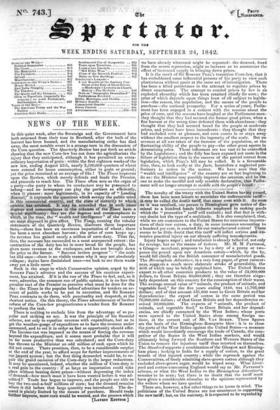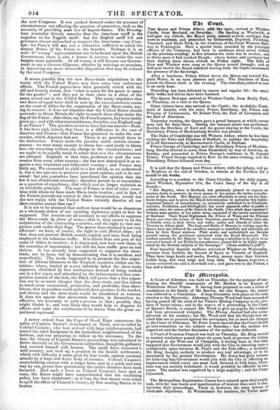facts,—there has been an enormous importation of wheat ; there
a hundred per cent, is exacted for our manufactured cotton! Them has been a most abundant harvest ; the price of corn keeps up ; seems to be little doubt that this tariff will inflict serious and 4* the revenue has gained nearly a million of corn-duty. Thus far, tensive practical injury on our already suffering manufecturers. then, the measure has succeeded to a most unexpected extent : the Injury begets anger ; and retaliation is already talked of, not only coutraction of 'the" duty has let in more bread for the people, has for revenge, but as the means of redress. Mr. M. M. Parrisoe, given more revenue to the exchequer, and has not brought down a Glasgow merchant, proposes to lay a duty of a penny or two- the price to the farmer. "Success invites progress ": " the scale pence the pound upon *raw American cotton—which, by the by, has slid once—there is no visible reason why it may not absolutely would fall chiefly on the British consumer of manufactured goods. collapse; duties have diminished once—we look to see them waste The Birmingham Advertiser, in a very long paper, of great earnest- away yet a little more." ness' suggests a much more elaborate stroke of generalship, the Such is the stage to which Conservative opinion, urged by Sir drift of which may be briefly explained here. The United States ROBERT PEEL'S advaine and the success of his cautious experi- export to all other countries products to the value of 52,000,000 ment, has attained. if it is the cue of the Times to feel, and, as it dollars, to Great Britain 60,000,0001.; they are therefore singu- were, advertise, he common run of public opinion, it is no less the larly dependent on this country for the consumption of their wares. peculiar tact of the Premier to perceive what must be done for the The average annual value of" animals, the product of animals, and day : the Times in the popular behoof advertises for tenders on ac- vegetable food," for the five years ending 1840, was 11,766,000 count of public works to be put in execution, and Sir ROBERT dollars; and of that amount 535,800 went to Great Britain and her PEEL contracts to do them, with punctuality and despatch, at the dependencies: the export of cotton in the same period was shortest notice. On this theory, the Times advertisement of further 76,000,000 dollars; of that Great Britain and her dependencies re- reform of the Corn-law prognosticates a tender from Sir ROBERT calved 50,000,000. The exports of "animals, the product of
to perform the task. animals, and vegetable food," to Great Britain and her depend-
There is nothing to exclude him from the advantage of so po- encies, are chiefly consumed by the West Indies; whose ports pular and striking an act. It-was the principle of his financial were opened to the United States alone among foreign na- scheme, not only to equalize revenue with expenditure, but so to tions, at the earnest suit of Mr. VAN BORER. These figures get the weather-guage of expenditure as to have the revenue under are the basis of the Birmingham-Bonaparte blow : it is to close command, and to set it in order as fast as opportunity should offer, the ports of the West Dtclies against the United States—a measure The Income-tax was imposed.as the means of forcing the revenue which would immediately encourage the trade of Canada, the corn- beyond the expenditure, and it seems most probable that it will petitor of the States in the West Indian markets, and would be far more productive than was calculated; and the Corn-duty ultimately bring forward the Southern and Western States of the has thrown to the Minister an odd million of cash upon which he Union to remove the injurious tariff thus retorted on themselves. did not count. There promises, then, to be a considerable surplus The Standard supports a combination of the Glasgow and Birming- at the end of the year, to afford scope for further improvements of ham plans ; looking to India for a supply of cotton, to the great ()orb:Tort system; but the first thing demanded would be, to re- benefit of that injured country ; while the reproach against the pair the grand omission of the Corn-duty in the larger reductions. Conservatives, of freely admitting slave-grown cotton although they It may be questioned, indeed, whether the million of Corn-duty is excluded slave-grown sugar, would be wiped away. What Liver- s real gain to the country : if so large an importation could take pool and cotton-consuming England would say to Mr. Parrisolv's place without beating down prices—without depressing the index scheme, or what the West Indies to the Birmiwham Advertisers, of demand—how much must it-have been wanted before it was ad- remains to be seen ; but there is no doubt that the tariff must mitted? Trade has begun to improve; and the people are able to, have given a considerable stimulus to the opinions represented by buy the two-and-a-half millions of Corn ;- but the demand remains the writers whom we have quoted. the next Congress. It was pushed forward under the pressure of circumstances not affecting the question of protection, such as the necessity of providing some law of importAuties. The Birming- ham journalist bitterly remarks that the American tariff is the response to the English tariff: but the English tariff left one grievance almost untouched as respects the Americans—our Corn- law : for PEEL'S bill was not a relaxation sufficient to admit the distant States of the Union to the benefits. Perhaps it is as well : if " strong" representations are to be forced upon the British Government, there is also a bonus in reserve, to make the new bargain more palatable. At all events, it will become our Govern- ment to use a discreet diligence, whether by warnings or promises, in imi roving any more favourable disposition that may be evinced by the next Congress.



























 Previous page
Previous page